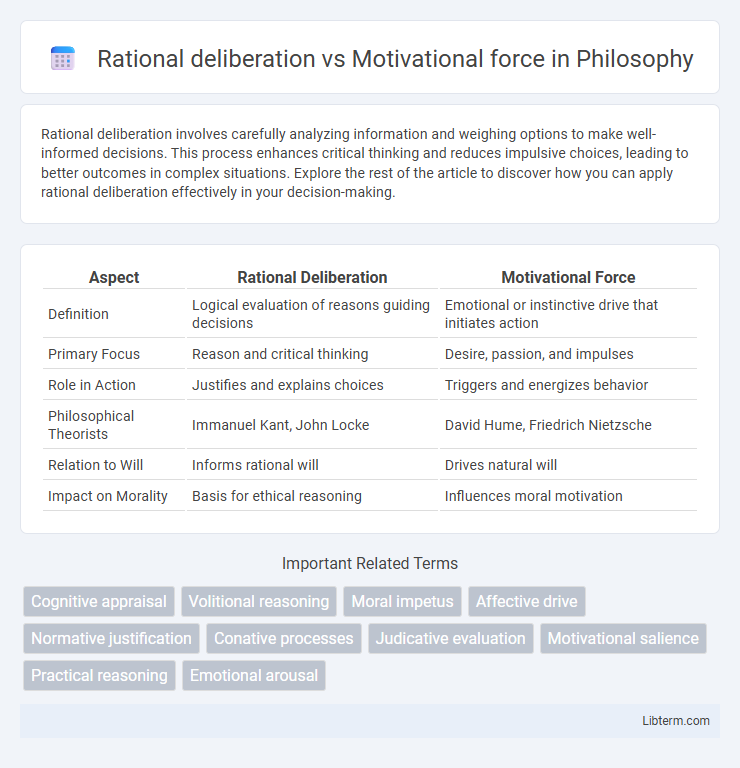Rational deliberation involves carefully analyzing information and weighing options to make well-informed decisions. This process enhances critical thinking and reduces impulsive choices, leading to better outcomes in complex situations. Explore the rest of the article to discover how you can apply rational deliberation effectively in your decision-making.
Table of Comparison
| Aspect | Rational Deliberation | Motivational Force |
|---|---|---|
| Definition | Logical evaluation of reasons guiding decisions | Emotional or instinctive drive that initiates action |
| Primary Focus | Reason and critical thinking | Desire, passion, and impulses |
| Role in Action | Justifies and explains choices | Triggers and energizes behavior |
| Philosophical Theorists | Immanuel Kant, John Locke | David Hume, Friedrich Nietzsche |
| Relation to Will | Informs rational will | Drives natural will |
| Impact on Morality | Basis for ethical reasoning | Influences moral motivation |
Understanding Rational Deliberation
Rational deliberation involves careful evaluation of evidence, reasons, and potential outcomes to make well-informed decisions. It prioritizes logical consistency and objective assessment over emotional impulses or immediate desires. Understanding rational deliberation requires recognizing its role in improving judgment by reducing biases and promoting reflective thinking.
The Concept of Motivational Force
Motivational force refers to the internal drive that compels individuals to act, often rooted in desire, emotion, or psychological needs, contrasting with purely rational deliberation based on logical assessment. It integrates cognitive appraisals with affective components, shaping decision-making processes beyond abstract reasoning. Neuroscientific studies highlight the role of the mesolimbic dopamine system in generating motivational salience, underscoring motivational force as a key determinant in behavioral activation.
Historical Perspectives on Human Reasoning
Historical perspectives on human reasoning emphasize the contrast between rational deliberation, which involves logical analysis and evidence-based decision-making, and motivational force, driven by emotions and desires influencing cognitive processes. Philosophers like Aristotle highlighted reason as a guiding principle for ethical behavior, while modern psychology explores how motivational biases can distort rational judgment. This dialogue informs contemporary debates on the balance between objective reasoning and subjective impulses in decision-making.
Cognitive Mechanisms of Deliberation
Cognitive mechanisms of deliberation involve systematic evaluation of options through working memory, attention control, and executive function, enabling rational decision-making based on evidence and logical reasoning. Motivational forces, however, can bias these processes by emphasizing affective and reward-driven factors, often leading to decisions that prioritize immediate gratification over long-term benefits. Understanding the interplay between deliberate cognitive control and underlying motivational drives is crucial for elucidating how humans balance reason and desire in complex decision-making.
Psychological Drivers of Motivation
Psychological drivers of motivation distinguish rational deliberation, involving conscious evaluation of goals and outcomes, from motivational force, which stems from emotional impulses and subconscious desires. Rational deliberation engages prefrontal cortex functions to weigh options based on anticipated rewards and long-term benefits. In contrast, motivational force activates limbic system structures, generating immediate urges that can bypass logical reasoning to influence behavior.
Rationality in Decision-Making
Rational deliberation in decision-making relies on objective analysis and logical evaluation of available information to identify the most effective course of action. Motivational force, however, emphasizes internal drives and desires that influence choices beyond purely cognitive reasoning. Balancing rationality with motivational factors ensures decisions are both logically sound and aligned with personal or organizational goals, enhancing overall effectiveness.
The Interplay Between Reason and Emotion
Rational deliberation involves systematic evaluation of evidence and logical reasoning to make decisions, while motivational force stems from emotional drives and desires that influence behavior. The interplay between reason and emotion shapes decision-making processes, where cognitive control can regulate emotional impulses to achieve goal-directed outcomes. Neuroscientific studies highlight the dynamic interaction between the prefrontal cortex, responsible for rational thought, and the limbic system, which governs emotional responses.
Philosophical Debates: Reason vs. Motivation
Philosophical debates on rational deliberation versus motivational force center on whether reason alone can determine actions or if motivation is necessary to translate thought into behavior. Rationalists argue that logical reasoning provides sufficient grounds for decision-making, while motivational theorists emphasize the role of desires and emotions in driving action. This tension highlights fundamental questions about human agency, autonomy, and the interplay between cognition and affect in ethical and practical reasoning.
Implications for Ethics and Behavior
Rational deliberation involves logical analysis and weighing of moral principles, which fosters consistent ethical decision-making and accountability. Motivational force drives individuals to act based on desires or emotions, revealing the importance of aligning ethical motivations with reason to ensure genuine moral behavior. Understanding the interplay between these factors can improve ethical frameworks by integrating both cognitive evaluation and motivational influences in behavioral predictions.
Bridging the Gap: Integrating Rationality and Motivation
Bridging the gap between rational deliberation and motivational force is essential for effective decision-making, as rationality provides logical evaluation while motivation drives action. Integrating cognitive insights from behavioral economics reveals how aligning goals with intrinsic motivators enhances commitment and follow-through. Leveraging neuropsychological research highlights the interplay between prefrontal cortex activity and limbic system impulses, facilitating balanced choices grounded in both reason and desire.
Rational deliberation Infographic

 libterm.com
libterm.com